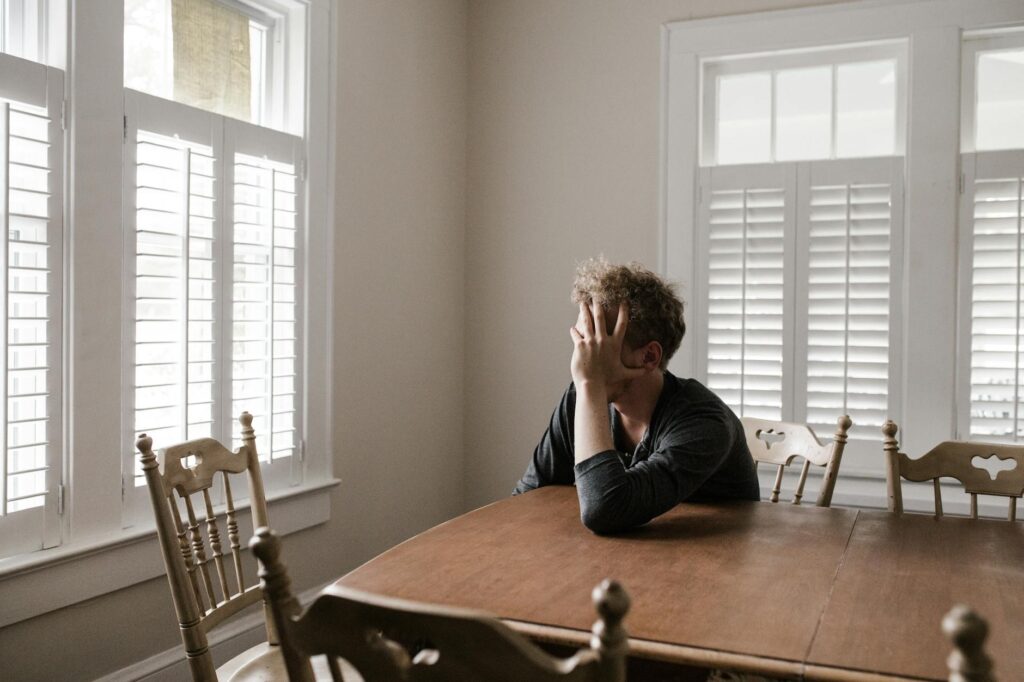Understanding Anxiety and Depression
Anxiety and depression are two common mental health conditions that can have a significant impact on a person’s well-being. It is important to have a clear understanding of these conditions to better navigate and address the challenges they present.
Definition and Overview
Anxiety is characterized by excessive worry, fear, or apprehension about future events or situations. It is a normal emotion that everyone experiences from time to time, but when it becomes persistent and interferes with daily life, it may be diagnosed as an anxiety disorder. Anxiety disorders are the most common form of mental illness in the United States, affecting approximately 40 million Americans or almost 20% of the adult population.
On the other hand, depression is a mood disorder that causes persistent feelings of sadness, hopelessness, and a loss of interest in activities. It is more than just feeling down or having a bad day. Depression affects people of all ages, races, income levels, and educational backgrounds. Approximately one in six people will experience a major depressive episode at some point in their lifetime, with up to 16 million adults in the United States suffering from clinical depression each year [2].
Both anxiety and depression can vary in severity and can significantly impact an individual’s daily life, relationships, and overall well-being. It is essential to seek professional help if symptoms persist or worsen over time. Understanding the causes, symptoms, and available treatment options can help individuals manage these conditions effectively.
Prevalence and Impact
Anxiety and depressive disorders are prevalent worldwide and have a significant impact on individuals and society as a whole. Anxiety disorders affect more than 40 million adults in the United States, which is approximately 18% of the population each year. It is worth noting that anxiety and depression often coexist, with nearly half of adults diagnosed with an anxiety disorder also experiencing some form of depressive disorder [1].
The COVID-19 pandemic has further highlighted the importance of mental health, as it led to a significant increase in anxiety and depression. In 2020, there was a 27.6% increase in depression and a 25.6% increase in anxiety disorders worldwide [3]. Despite the prevalence of these disorders, many individuals do not receive proper treatment. Close to 10% of the world’s population suffers from anxiety and depression, yet only a small percentage of affected individuals seek or receive treatment.
Understanding the prevalence and impact of anxiety and depression is crucial in promoting awareness, reducing stigma, and encouraging individuals to seek the help they need. It is important to remember that anxiety and depression are treatable conditions, and with appropriate support and treatment, individuals can find relief and improve their quality of life.
Treatment Options for Depression
When it comes to treating depression, there are several options available, including medication and psychotherapy. These treatments can be used individually or in combination, depending on the severity and specific needs of the individual.
Medication and Psychotherapy
A combination of medication and psychotherapy has been associated with significantly higher rates of improvement in more severe, chronic, and complex presentations of depression. Antidepressant medications, such as selective serotonin reuptake inhibitors (SSRIs) or serotonin-norepinephrine reuptake inhibitors (SNRIs), are commonly prescribed to alleviate symptoms of depression. These medications work by balancing the brain chemicals that are involved in mood regulation. However, it is important to note that different antidepressant medications may need to be tried before finding the one that works best for an individual. Antidepressants usually take some time (2 to 4 weeks) before they impact the symptoms.
It is essential for individuals taking antidepressants to be closely monitored, especially when starting the medication. Antidepressants may present risks to some individuals, particularly children, teens, and young adults. Regular follow-up appointments with a healthcare professional are important to assess the effectiveness of the medication and to monitor any potential side effects.
In addition to medication, psychotherapy, such as Cognitive Behavioral Therapy (CBT) and Interpersonal Therapy, is an evidence-based approach for the treatment of depression. CBT focuses on helping individuals identify and modify maladaptive thinking and behavior patterns, which can contribute to depressive symptoms. Through CBT, individuals can learn coping strategies, problem-solving skills, and ways to challenge negative thoughts and beliefs.
Electroconvulsive Therapy (ECT)
In some cases, when other treatments have not been effective or the individual is experiencing severe symptoms, electroconvulsive therapy (ECT) may be considered. ECT is a medical procedure that involves delivering electrical currents to the brain, intentionally triggering a brief seizure. This therapy is typically performed under general anesthesia, and the procedure is carefully monitored by a healthcare team.
ECT has been found to be effective for patients who do not respond to drug therapy, are psychotic, or are suicidal or dangerous to themselves. It is often reserved for severe cases of depression when rapid relief is necessary or when other treatment options have not been successful.
It is important to consult with a healthcare professional to determine the most appropriate treatment approach for depression. The choice of treatment will depend on various factors, including the severity of symptoms, individual preferences, and any co-occurring conditions. Working closely with a healthcare team can help ensure that the treatment plan is tailored to the individual’s needs and provides the best opportunity for recovery.
Managing Anxiety and Depression
Effectively managing anxiety and depression is crucial for improving overall well-being and quality of life. There are various strategies and resources available to help individuals cope with these conditions. This section will explore lifestyle changes, the importance of professional help, and crisis resources.
Lifestyle Changes
Making certain lifestyle changes can play a significant role in managing anxiety and depression. While these changes may not be a substitute for professional treatment, they can complement other interventions and contribute to overall well-being.
Some lifestyle changes that may be beneficial include:
- Regular exercise: Engaging in physical activity can help release endorphins, which are natural mood boosters. Exercise also promotes better sleep and reduces stress levels.
- Healthy diet: Consuming a balanced diet can provide essential nutrients that support brain health. Including foods rich in omega-3 fatty acids, such as fish, walnuts, and flaxseeds, may be beneficial for mental health.
- Sufficient sleep: Establishing a regular sleep routine and ensuring adequate sleep can help regulate mood and improve overall mental well-being.
- Stress management techniques: Practicing stress management techniques, such as deep breathing exercises, meditation, or yoga, can help reduce anxiety and promote relaxation.
- Social support: Maintaining strong social connections and seeking support from friends, family, or support groups can provide a sense of belonging and emotional support.
While lifestyle changes can be helpful, it’s essential to remember that they may not be sufficient for managing more severe cases of anxiety and depression. Professional help should also be considered.
Importance of Professional Help
Professional help is crucial in the treatment of anxiety and depression. Mental health professionals, such as psychiatrists, psychologists, or licensed therapists, are trained to provide effective interventions tailored to individual needs.
Treatment options may include:
- Medication and psychotherapy: A combination of medication and psychotherapy has been associated with significantly higher rates of improvement in more severe, chronic, and complex presentations of depression [4].
- Cognitive Behavioral Therapy (CBT): CBT is a widely recognized therapeutic approach that helps individuals identify and change negative thought patterns and behaviors. It can be effective in managing both anxiety and depression.
- Electroconvulsive Therapy (ECT): ECT may be recommended for severe or treatment-resistant depression. This procedure involves passing controlled electrical currents through the brain to induce a brief seizure, which can help alleviate symptoms.
It’s important to consult with a healthcare professional to determine the most appropriate treatment options based on individual circumstances and the severity of the condition. They can provide guidance and monitor progress throughout the treatment process.
Crisis Resources
In times of crisis, it’s essential to be aware of available resources for immediate support. Crisis resources can provide necessary assistance during periods of severe anxiety or depression. Some resources include:
- Crisis hotlines: These helplines offer immediate support and guidance from trained professionals. They are available 24/7 and can provide a listening ear, crisis intervention, and information on local mental health services.
- Emergency departments: If immediate help is needed, individuals can go to the nearest emergency department for a mental health evaluation and appropriate care.
- Inpatient or outpatient treatment programs: For severe cases, participating in an inpatient or outpatient treatment program may be necessary until symptoms improve.
If you or someone you know is in crisis, it’s important to reach out to these resources promptly. Remember, seeking help is a sign of strength, and there is support available to help individuals navigate through difficult times.
By implementing lifestyle changes, seeking professional help, and utilizing crisis resources when needed, individuals can actively manage anxiety and depression, leading to improved well-being and a better quality of life.
Legal Rights and Accommodations
Individuals with depression and anxiety may wonder about their legal rights and the accommodations available to them in the workplace. The Americans with Disabilities Act (ADA) and other laws provide protections and guidelines to ensure equal opportunities for individuals with disabilities, including those with mental health conditions.
Americans with Disabilities Act (ADA)
The Americans with Disabilities Act (ADA) is a federal law that prohibits discrimination against individuals with disabilities in various areas, including employment. Under the ADA, individuals with depression and anxiety may be considered to have a disability if their condition substantially limits one or more major life activities, such as working, interacting with others, or concentrating.
Reasonable Accommodations
One of the key provisions of the ADA is the requirement for employers to provide “reasonable accommodations” to qualified employees with disabilities. Reasonable accommodations are adjustments or modifications made to the work environment or job tasks that enable individuals with disabilities to perform essential job functions.
For individuals with depression and anxiety, reasonable accommodations can vary depending on the specific needs of the individual and the nature of their job. Accommodations can include:
- Flexibility in work hours or schedules to accommodate therapy or medical appointments
- Modification of workspaces or equipment for improved comfort and productivity
- Adjustments to workload or job tasks to reduce stress and anxiety
- Providing additional breaks or time off for self-care or mental health support
Employers are required to engage in an interactive process with employees to determine appropriate accommodations. It’s important for individuals to communicate their needs and work collaboratively with their employers to find effective solutions [6]. For more information on accommodations, consult our article on how to deal with depression and anxiety.
Protections Against Discrimination
The ADA also prohibits employers from discriminating against individuals with disabilities, including those with depression and anxiety. Employers cannot take adverse actions, such as termination or demotion, based solely on an individual’s mental health condition. It is essential for individuals to understand their rights and protections under the ADA and to seek legal advice if they believe they have experienced discrimination in the workplace.
If you are experiencing discrimination or need guidance on your legal rights, resources such as the Equal Employment Opportunity Commission (EEOC) can provide information and assistance. Remember, you have the right to a workplace that is free from discrimination and to reasonable accommodations that allow you to perform your job effectively while managing your depression and anxiety.
Understanding your legal rights and the available accommodations is crucial for individuals with depression and anxiety in the workplace. By advocating for yourself and seeking the necessary support, you can ensure equal opportunities and a supportive work environment that promotes your well-being.
Impact on Quality of Life
Living with anxiety and depression can significantly impact an individual’s quality of life. These conditions can affect various aspects of functioning, including impairments, physical health, role limitations, and social functioning.
Functioning and Impairments
Anxiety and depressive symptoms have been found to significantly impair functioning in different areas of life. According to a study published in the National Center for Biotechnology Information (NCBI), almost 40% of the sample reported anxiety symptoms, while 30% reported depressive symptoms. The severity of these symptoms directly correlates with the decrease in the quality of life.
In fact, individuals with moderate to severe anxiety or depressive symptoms experience greater impairments in most domains of quality of life compared to individuals with conditions such as acute myocardial infarction, congestive heart failure, or diabetes. The impairments can affect work functioning, social functioning, and overall health. Anxiety and depressive disorders have been associated with decreased work productivity, impaired work-family-social functioning, physical disability, and even mortality [7].
Relationship to Physical Health
Anxiety and depression not only impact mental well-being but also have a profound relationship with physical health. Studies have shown that the quality of life among individuals with depression is more impaired than those with chronic physical conditions like diabetes, hypertension, and chronic lung disease. The presence of anxiety has also been associated with decreased work productivity, impaired social functioning, physical disability, and even mortality.
It is essential to recognize the intricate connection between mental and physical health. Addressing anxiety and depression can have a positive impact on overall well-being, improving both mental and physical aspects of life.
Role Limitations and Social Functioning
Anxiety and depressive symptoms can significantly limit an individual’s ability to fulfill various roles in life. This includes roles at work, within the family, and in social settings. The impact on role limitations and social functioning can be substantial, affecting an individual’s ability to perform daily tasks, engage in social interactions, and participate in activities they once enjoyed.
A study published in the NCBI found that anxiety symptoms were associated with limitations in physical functioning, role limitations due to physical or emotional health problems, social functioning, pain, vitality, emotional well-being, and general health perceptions. Depressive symptoms also had a significant effect on all domains of quality of life, including functioning and well-being.
Individuals with mild levels of anxiety or depressive symptoms experience worse functioning compared to those with no symptoms. Similarly, individuals with moderate to severe symptoms face even greater impairments in functioning. The severity of anxiety or depressive symptoms directly correlates with the level of impairment, resulting in a clear incremental worsening of functioning with increasing symptom severity.
It is crucial to recognize the impact of anxiety and depression on quality of life and seek appropriate support and treatment. Managing these conditions can help improve functioning, reduce impairments, and enhance overall well-being.
Creating Resilience and Coping
When it comes to dealing with anxiety and depression, creating resilience and developing effective coping strategies is crucial. These practices can help individuals better manage their mental health and improve their quality of life. In this section, we will explore three key aspects of creating resilience and coping: acknowledging mental health, building resilience, and improving quality of life.
Acknowledging Mental Health
Acknowledging and addressing mental health is an essential first step towards building resilience and coping with anxiety and depression. It involves recognizing and accepting one’s own emotions, thoughts, and experiences. By acknowledging mental health concerns, individuals can seek appropriate support and treatment, allowing them to better cope with their condition.
It’s important to remember that mental health is just as important as physical health. If you or someone you know is experiencing symptoms of anxiety or depression, reaching out to a mental health professional is crucial. They can provide guidance, support, and evidence-based treatments to help manage these conditions. For more information on what depression and anxiety feels like, visit our article on what depression and anxiety feels like.
Building Resilience
Building resilience is a key aspect of effectively coping with anxiety and depression. Resilience refers to the ability to adapt and bounce back from challenging situations. It involves developing strategies and skills to navigate through difficult emotions and circumstances. Here are some tips for building resilience:
Seek social support: Surround yourself with a supportive network of friends, family, or support groups. Having people who can listen and provide guidance can make a significant difference in your ability to cope.
Practice self-care: Engage in activities that promote self-care and well-being. This can include exercising regularly, getting enough sleep, eating a balanced diet, and engaging in hobbies or activities that bring joy and relaxation.
Develop healthy coping mechanisms: Find healthy ways to manage stress and emotions. This can include practicing mindfulness or meditation, journaling, engaging in creative outlets, or seeking therapy.
Set realistic goals: Break down larger goals into smaller, manageable steps. Celebrate small achievements along the way, as this can boost confidence and motivation.
Maintain a positive mindset: Focus on positive aspects of your life and practice gratitude. Surround yourself with positive influences and challenge negative self-talk.
Building resilience takes time and effort, but it can significantly improve your ability to cope with anxiety and depression.
Improving Quality of Life
Anxiety and depression can have a significant impact on an individual’s quality of life. These conditions can impair functioning in various areas, including work, social interactions, and overall health. However, there are steps you can take to improve your quality of life:
Seek appropriate treatment: Consult with healthcare professionals to explore treatment options that work best for you. This may include therapy, medication, or a combination of both. Remember that treatment plans are individualized, and what works for one person may not work for another.
Practice self-care: Engage in activities that promote well-being and self-care. Prioritize activities that bring you joy and help you relax. Consider incorporating exercise, healthy eating, and stress reduction techniques into your routine.
Manage stress: Develop effective stress management techniques to minimize the impact of stress on your mental health. This may include practicing mindfulness, deep breathing exercises, or engaging in hobbies that help you unwind.
Maintain a support network: Surround yourself with supportive individuals who understand and respect your mental health journey. Connect with friends, family, or support groups that provide a safe space for sharing experiences and seeking guidance.
Engage in self-reflection: Take time to reflect on your values, strengths, and goals. Set realistic expectations for yourself and focus on personal growth rather than comparing yourself to others.
By taking these steps, individuals with anxiety and depression can actively work towards improving their quality of life and finding a sense of well-being. Remember, it’s important to reach out for professional help and support when needed. For crisis resources and assistance, please refer to our article on crisis resources.
Resources
- [1]: https://advancedpsychiatryassociates.com/resources
- [2]: https://www.mayoclinic.org/diseases-conditions/depression/symptoms-causes
- [3]: https://www.mayoclinichealthsystem.org
- [4]: https://adaa.org/understanding-anxiety/depression/treatment-management
- [5]: https://www.eeoc.gov/laws/guidance/enforcement-guidance-ada-and-psychiatric-disabilities
- [6]: https://www.dol.gov/agencies/odep/program-areas/mental-health
- [7]: https://www.ncbi.nlm.nih.gov/pmc/articles
Did You Know? According to WHO, one out of every seven teens is struggling with some sort of mental illness.










